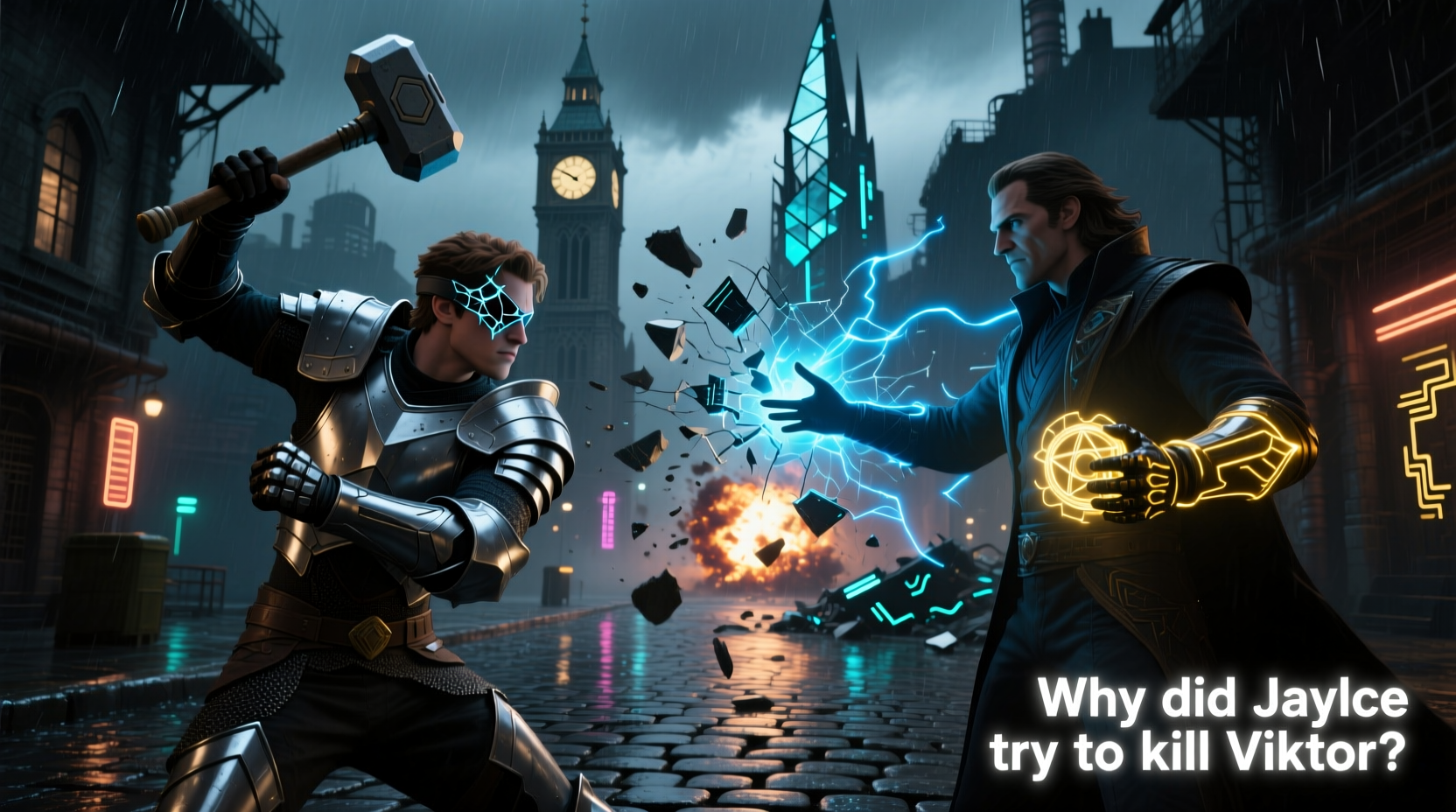The rift between Jayce Talis and Viktor is one of the most emotionally charged and philosophically rich conflicts in Netflix’s *Arcane*. What begins as a shared dream of progress and enlightenment ends in betrayal, violence, and tragedy. The moment when Jayce attempts to kill Viktor—during the final confrontation in Zaun—is not just a dramatic climax; it's the culmination of years of diverging values, escalating fears, and broken trust. To understand why Jayce reached that point, we must trace the evolution of their relationship, their ideals, and the pressures that transformed allies into enemies.
The Origins of a Shared Vision

Jayce and Viktor first met as idealistic scientists in Piltover, united by a passion for Hextech innovation. Their early collaboration centered on harnessing arcane energy to improve lives—Viktor driven by a desire to transcend human limitations, Jayce motivated by a belief in progress through responsible innovation. Together, they unlocked the power of the arcane crystal, believing it could revolutionize medicine, infrastructure, and quality of life across both Piltover and Zaun.
However, their partnership began to fracture under external and internal pressures. Heimerdinger, their mentor, urged caution. The council of Piltover, represented by figures like Councilor Mel Medarda, pushed for control and militarization of the technology. These forces pulled Jayce and Viktor in opposite directions, setting the stage for ideological divergence.
The Turning Point: Power, Fear, and Control
The pivotal moment occurs when Jayce chooses to present the arcane cannon—a weaponized application of their research—to the Piltover Council. Viktor sees this as a betrayal of their original mission. For him, science should liberate, not dominate. He refuses to endorse the weaponization of their work, leading to his public humiliation and professional exile.
This decision marks the end of their alliance. Jayce, now embraced by Piltover’s elite, gains status and influence. Viktor, ostracized and increasingly ill due to exposure to unstable tech, retreats into radicalism. His desperation to survive and evolve leads him to experiment on himself, merging flesh with machine in pursuit of what he calls “the glory of evolution.”
Jayce, meanwhile, becomes a symbol of order and protection—but also of complicity. He defends Piltover’s policies even as they neglect and exploit Zaun. From Viktor’s perspective, Jayce has chosen comfort over conscience, power over principle.
Key Differences in Philosophy
| Aspect | Jayce | Viktor |
|---|---|---|
| View of Progress | Controlled, regulated advancement | Radical transformation beyond limits |
| Motivation | Duty, legacy, public approval | Survival, transcendence, liberation |
| Approach to Risk | Risk-averse, cautious | Risk-embracing, experimental |
| Relationship with Power | Works within existing systems | Seeks to dismantle and rebuild |
| Core Belief | \"We can make the world better without breaking it.\" | \"To save humanity, we must become more than human.\" |
The Descent into Conflict
Their paths cross again during the chaos of Silco’s uprising and the spread of Shimmer. By this time, Viktor has aligned with Silco—not out of loyalty, but because he sees opportunity. Zaun’s suffering population becomes both his test group and his justification. When Ekko is critically injured, Viktor offers a cybernetic solution, further blurring the line between healer and manipulator.
Jayce, now a protector of Piltover, views Viktor’s experiments as dangerous and unethical. He sees the man he once admired as a threat—not just to the city, but to the very idea of balanced progress. The emotional weight of their history makes the confrontation personal. It’s no longer just about policy or science; it’s about betrayal, regret, and the pain of seeing a friend become a monster.
“Every choice we made was meant to help people. But somewhere along the way, we stopped listening to each other.” — Jayce, *Arcane*
The Final Confrontation: Why Jayce Tried to Kill Viktor
The climactic scene in Zaun’s depths is layered with emotion and symbolism. Jayce arrives determined to stop Viktor’s latest experiment—one that could destabilize the entire underground city. He pleads with Viktor to stand down, appealing to their shared past. But Viktor, now fully committed to his vision, refuses. He sees himself as the only one willing to pay the price for true change.
When words fail, Jayce raises his hammer. The attack is not premeditated murder, but a desperate act of prevention. He believes Viktor’s next move will cause mass destruction. In that moment, Jayce doesn’t see his former friend—he sees a ticking bomb. The attempt to kill Viktor is not born of hatred, but of fear, duty, and the unbearable weight of responsibility.
Moreover, Jayce is grappling with guilt. He knows he contributed to Viktor’s fall by choosing power over partnership. Killing Viktor would be both an end to the threat and an escape from that guilt—a way to erase the consequences of his own earlier decisions.
Timeline of the Relationship Breakdown
- Early Collaboration: Jayce and Viktor co-develop arcane energy applications under Heimerdinger’s guidance.
- Council Presentation: Jayce unveils the arcane cannon; Viktor opposes weaponization and is sidelined.
- Exile and Isolation: Viktor is removed from the project, begins secret experiments in Zaun.
- Divergent Paths: Jayce becomes a hero of Piltover; Viktor embraces radical augmentation.
- Reunion and Escalation: They clash over Shimmer, Jinx, and the fate of Zaun.
- Final Confrontation: Jayce attempts to stop Viktor by force, nearly killing him.
Expert Insight: The Tragedy of Ideological Extremes
Dr. Lena Petrov, cultural analyst and narrative scholar, explains:
“The tragedy of Jayce and Viktor isn’t that one is right and the other wrong—it’s that both are partially right, and both are blinded by their convictions. Jayce represents institutional responsibility that risks stagnation; Viktor embodies revolutionary change that risks chaos. Their conflict mirrors real-world debates about technological ethics, where progress often comes at a moral cost.” — Dr. Lena Petrov, Narrative Ethics Researcher
Frequently Asked Questions
Did Jayce actually want to kill Viktor?
No, Jayce did not seek vengeance or personal harm. His intention was to stop Viktor from activating a potentially catastrophic device. The lethal force was a last resort, driven by urgency and fear of collateral damage.
Was Viktor justified in his actions?
Viktor’s motives—ending suffering and advancing human potential—are noble, but his methods are ethically compromised. Using Shimmer on children and conducting unconsented experiments crosses moral boundaries, even if his end goal is salvation.
Could their conflict have been avoided?
Possibly. If Piltover had supported ethical innovation without weaponizing it, and if Jayce had stood by Viktor instead of aligning with the Council, their partnership might have endured. Communication, empathy, and structural reform could have changed the outcome.
Actionable Checklist: Understanding Moral Conflicts in Storytelling
- Identify each character’s core motivation and backstory.
- Map how external pressures (society, institutions, trauma) shape their choices.
- Look for moments where compromise was possible but failed.
- Analyze whether the conflict is truly good vs. evil—or competing goods.
- Consider how redemption, regret, or reconciliation could still play a role.
Conclusion: A Call to Reflect on Progress and Empathy
The story of Jayce and Viktor is not just a tale of two scientists gone astray—it’s a warning about the cost of unchecked ambition, systemic inequality, and the erosion of empathy in the name of progress. Their conflict teaches us that even the best intentions can lead to destruction when divorced from compassion and dialogue.
As viewers, we’re challenged to ask: Who decides what progress looks like? And at what point does protecting the future justify sacrificing the present?









 浙公网安备
33010002000092号
浙公网安备
33010002000092号 浙B2-20120091-4
浙B2-20120091-4
Comments
No comments yet. Why don't you start the discussion?